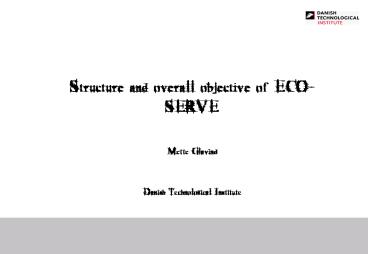Structure and overall objective of ECOSERVE - PowerPoint PPT Presentation
1 / 17
Title:
Structure and overall objective of ECOSERVE
Description:
Designed, built, operated or reused in a ressource-efficient manner ... Have an optimal clinker content according to the intended strength and durability. ... – PowerPoint PPT presentation
Number of Views:18
Avg rating:3.0/5.0
Title: Structure and overall objective of ECOSERVE
1
- Structure and overall objective of ECO-SERVE
- Mette Glavind
- Danish Technological Institute
2
Agenda
- 10h00 Structure and overall objective of
ECO-SERVE Task 2 - 10h30 Life cycle thinking and tools, life cycle
data and limitations of ECO-SERVE - 11h30 Break
- 11h45 Indicator examples, all clusters
- 12h15 Lunch
- 13h15 Introduction to cluster group work
- 13h30 Group work in clusters
- 15h00 Break
- 15h30 Summary for all (by cluster leaders)
- 16h30 Further issues and what next
- 16h45 End of meeting
3
Aim of workshop
- To create a common understanding of sustainable
cement, aggregate, concrete and pavement - To start the work with selecting environmental
indicators
4
ECO-SERVE Objective
- Reduce the environmental impact of the
construction industry - Improve the working environment
- Contribute to growth and wealth by increasing
productivity, competitiveness and quality
5
Task 2 Objectives
- Establish environmental baseline
- Establish Best Available Technology (BAT)
- Develop environmental indicators
- Develop tools and guidelines for the clusters
- Mapping/identification of players in the
ECO-SERVE field
6
Definition of an environmentally sustainable
concrete structure
- Designed, built, operated or reused in a
ressource-efficient manner - Utilising the inherently environmentally
beneficial properties - Tailor-made for the use
- Total environmental impact during the entire life
cycle reduced to a minimum - Proposal from Concrete for the environnment - a
Nordic Network.
7
Criteria
- Use aggregate that is extracted in an
environmentally sound manner - Use cement manufactured using modern production
technology, recycled raw materials and
alternative energy sources. - Be produced at concrete plants where
environmental impact is minimised, - Have an optimal clinker content according to the
intended strength and durability. - Not introduce environmental problems such as
leaching of heavy metals etc. - Proposal from Concrete for the environnment - a
Nordic Network
8
Examples of ways to achieve sustainable concrete
structures
- Use recycled products such as silica fume, fly
ash and slag etc. - Use the good durability of concrete to increase
the service life. - Use the strength to minimise the total concrete
volume needed. - Use the thermal capacity to reduce the energy
consumption - Proposal from Concrete for the environnment - a
Nordic Network
9
About benchmarking
- Benchmarking is to compare with competitors, e.g.
productivity or energy consumption - If the company in the bottom can get to the level
of the company in top, substantial improvents are
made - Simple key-parameters are essential
10
Three levels
- RD level
- BAT
- Baseline average
11
Environmental impact of structures dependent on
Demolition and reuse/recycling
Raw materials extraction and processing
Service, repair and maintenance
Construction
Materials production
12
Task 2 interaction with clusters
Steering committee
Task 2
Cluster 2 Blended cements
Cluster 1 Alternative fuels
Cluster 3 Aggregate/ concrete
Cluster 4 Pavements
13
Task 2 challenges
- To secure network objectives are fulfilled
- To secure a life cycle thinking while the network
focuses on materials - To consider national and regional differences
- To develop operational tools
- To co-ordinate between clusters
14
Keywords
Simple
Practical
15
Task 2 in practice
- Prepare guidelines/examples
- Clusters suggest/revise indicators
- Comments from task 2
- Discussion/agreement
- Data collection by clusters
- Calculation /gathering of data
16
Available material
- Note Cleaner Materials Production plus
Structure - Slides from presentations today
- Memo to introduce to group work
17
10h30 Life cycle thinking and tools, life cycle
data and limitations of ECO-SERVEAgnes
Schuurmans, Intron































